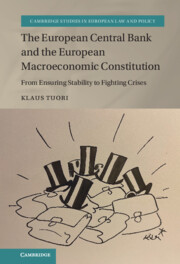 The European Central Bank and the European Macroeconomic Constitution
The European Central Bank and the European Macroeconomic Constitution from Part II - Crises, ECB Measures and the Macroeconomic Constitution
Published online by Cambridge University Press: 15 September 2022
The sovereign debt crisis shook the foundations of the euro area economic framework and ECB. It marked a clear change from the past. The chapter describes the events, starting with the Greek situation, and continuing to the problems related to Italy and Spain. For the ECB and European Macroeconomic Constitution, the main issues related to measures that were increasingly directed at easing economic and financial market stress concerning individual Member States’ public finances. Hence the constitutional concerns over the ECB’s legal mandate became more pronounced and contested. The chapter analyses the ECB’s verbal interventions, drafting and involvement in rescue plans, but also the role of the longer-term financing for banks in creating the vicious link between banks and sovereigns is discussed. The main constitutional conclusions relate to the ECB’s activities outside the sphere of monetary policy. They could be deemed alarming for the independence of the ECB, but they also could have distorted the institutional balance within the EU. Furthermore, the role of LTROs in encouraging banks to purchase government bonds underlines the problem with extending the reach of monetary policy measures.
To save this book to your Kindle, first ensure no-reply@cambridge.org is added to your Approved Personal Document E-mail List under your Personal Document Settings on the Manage Your Content and Devices page of your Amazon account. Then enter the ‘name’ part of your Kindle email address below. Find out more about saving to your Kindle.
Note you can select to save to either the @free.kindle.com or @kindle.com variations. ‘@free.kindle.com’ emails are free but can only be saved to your device when it is connected to wi-fi. ‘@kindle.com’ emails can be delivered even when you are not connected to wi-fi, but note that service fees apply.
Find out more about the Kindle Personal Document Service.
To save content items to your account, please confirm that you agree to abide by our usage policies. If this is the first time you use this feature, you will be asked to authorise Cambridge Core to connect with your account. Find out more about saving content to Dropbox.
To save content items to your account, please confirm that you agree to abide by our usage policies. If this is the first time you use this feature, you will be asked to authorise Cambridge Core to connect with your account. Find out more about saving content to Google Drive.